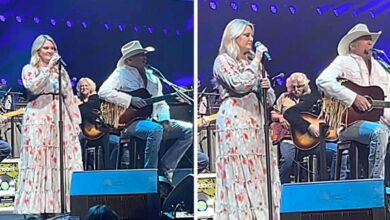As He Starts The Third Verse, It’s The Most Beautiful Sound Ever Created
Elvis Presley’s live rendition of “Never Been To Spain” during his 1972 performances in Las Vegas is often heralded as a high point in his already illustrious career. This song, penned by songwriter Hoyt Axton and brought to fame by the band Three Dog Night in 1971, benefitted from Elvis’s unique interpretative style. The way he infused the song with his unmistakable blend of rock, blues, and soul transformed it into something uniquely his own. His version not only captivated audiences at the time but has left a lasting impression on music lovers across generations.
The context of Elvis’s Las Vegas performances in the early 1970s provides a fascinating backdrop for understanding the power of his rendition. This period marked the apex of his live showmanship, where he combined his musical talents with a keen sense of theatricality. Each concert was a celebration of his artistry, showcasing a range of songs that transcended simple entertainment. With “Never Been To Spain,” he captured themes of exploration and emotional vulnerability, allowing the lyrics to resonate deeply with listeners. Fans often found themselves swept up not just in the rhythm, but in the emotional journey he conjured on stage.
In the context of a live performance, Elvis showcases his extraordinary ability to command the stage. The musical arrangement for “Never Been To Spain” features a vibrant rhythm section that propels the song forward, accompanied by a brass ensemble that punctuates his vocals with intensity. This instrumental backdrop serves to amplify Elvis’s commanding vocal delivery, which is filled with emotion and a palpable sense of longing. Listeners can feel the yearning embedded in the lyrics as they are brought to life through his expressive interpretation, enhancing the song’s themes of exploration and introspection.
Elvis’s connection with his audience during his 1972 Las Vegas shows is particularly noteworthy. His magnetic stage presence and infectious energy create an atmosphere of excitement and engagement. Each performance became a showcase of his ability to communicate with fans on a personal level, drawing them into the storytelling aspect of the song. Whether he was pouring his heart into the anthemic chorus or reflecting on the more tender moments of the lyrics, Elvis skillfully navigated dynamic shifts in tone and energy, demonstrating his remarkable versatility as a performer. The intimacy he felt with his fans was palpable, making every show feel both monumental and personal.
The Las Vegas setting further elevated the experience. Elvis’s shows became synonymous with entertainment, combining high-energy music with elaborate visual elements. The opulent environment of Las Vegas was the perfect venue for a performer of Elvis’s caliber, where every concert felt like a grand event. The audience was treated to more than just music; they were immersed in a spectacle of lights, sounds, and emotions that only Elvis could orchestrate. This environment allowed his performances to transcend mere musical engagement and evolve into visceral experiences that left lasting memories for those fortunate enough to be in attendance.
Born on January 8, 1935, in Tupelo, Mississippi, Elvis Aaron Presley rose to fame in the 1950s, becoming one of the most influential figures in the history of popular music. From his groundbreaking recordings at Sun Records to his iconic live shows, his contributions to the music industry are unparalleled. Elvis’s pioneering of rock and roll not only reshaped the music landscape but also influenced numerous artists across various genres. His unique fusion of musical styles, combined with his charismatic persona, solidified his status as a cultural icon. Emerging in an era ripe for change, Elvis became a driving force in the movement that blended rhythm and blues with country, creating a fresh sound that resonated with diverse audiences.
Elvis’s ability to reinterpret songs has always been a defining feature of his artistry. “Never Been To Spain” stands out as a prime example of how he could take existing material and transform it, infusing it with his distinctive flair. His interpretative skills reveal the depth of his artistry and his capability to convey feelings and emotions that resonate deeply with listeners. The sincerity of his performances often left audiences feeling as though he was sharing personal stories and experiences, a feat few artists can achieve. It is this ability to create a connection through the music that remains a hallmark of his enduring legacy.
The impact Elvis had on popular culture extends beyond his music. His fashion choices, characterized by flamboyant jumpsuits and stylish hairstyles, became emblematic of the era. He made a mark in the film industry with notable performances in movies like “Jailhouse Rock,” “Elvis on Tour,” and “Blue Hawaii.” These films showcased his multi-faceted talent and helped establish him as a household name. Each role revealed another layer of his artistry, allowing the public to see not just a singer but a charismatic performer willing to explore various forms of entertainment, further capturing the hearts of audiences worldwide.
Elvis’s rise to fame was also a significant cultural phenomenon. His ability to cross racial boundaries through music was groundbreaking. At a time when America was deeply segregated, he was pivotal in bringing radio play to Black gospel and R&B artists, amplifying their influences in his work. His success represented a burgeoning acceptance of integration in American culture, allowing for the blending of different musical traditions that would ultimately enrich the industry and provide greater opportunities for other artists. His influence on generations of musicians, including those in rock, pop, country, and beyond, is profound and continues to be felt today.
In examining a specific performance like “Never Been To Spain,” it becomes clear that Elvis was more than just an entertainer; he was a storyteller and a conduit for powerful emotions. The themes of the song touch upon the inherent human desire for adventure and the complexities of life’s journey. His ability to convey feelings of wanderlust and longing, combined with his charismatic performance style, creates an enthralling experience for audiences. This blend of musical talent and emotive storytelling is what makes his work resonate with so many, ensuring that Elvis’s music continues to inspire and evoke emotions decades after his passing.
As we reflect on the legacy of Elvis Presley, it’s important to recognize that his contributions extend far beyond his music. His life story is one of triumph, resilience, and transformation, mirroring the experiences of many in a rapidly changing America. Elvis’s journey illuminates the power of creativity, the potential of music to unite, and the importance of staying true to one’s artistic voice. In summation, Elvis Presley’s live performance of “Never Been To Spain” serves as a showcase of his artistry and cultural significance. The song, through his passionate delivery and the electric atmosphere of Las Vegas, highlights why Elvis remains a timeless figure in music history. His life and career are reminders of the power of music to connect people, tell vivid stories, and evoke deep emotional responses, solidifying his place as one of the greats in the pantheon of musical legends.





